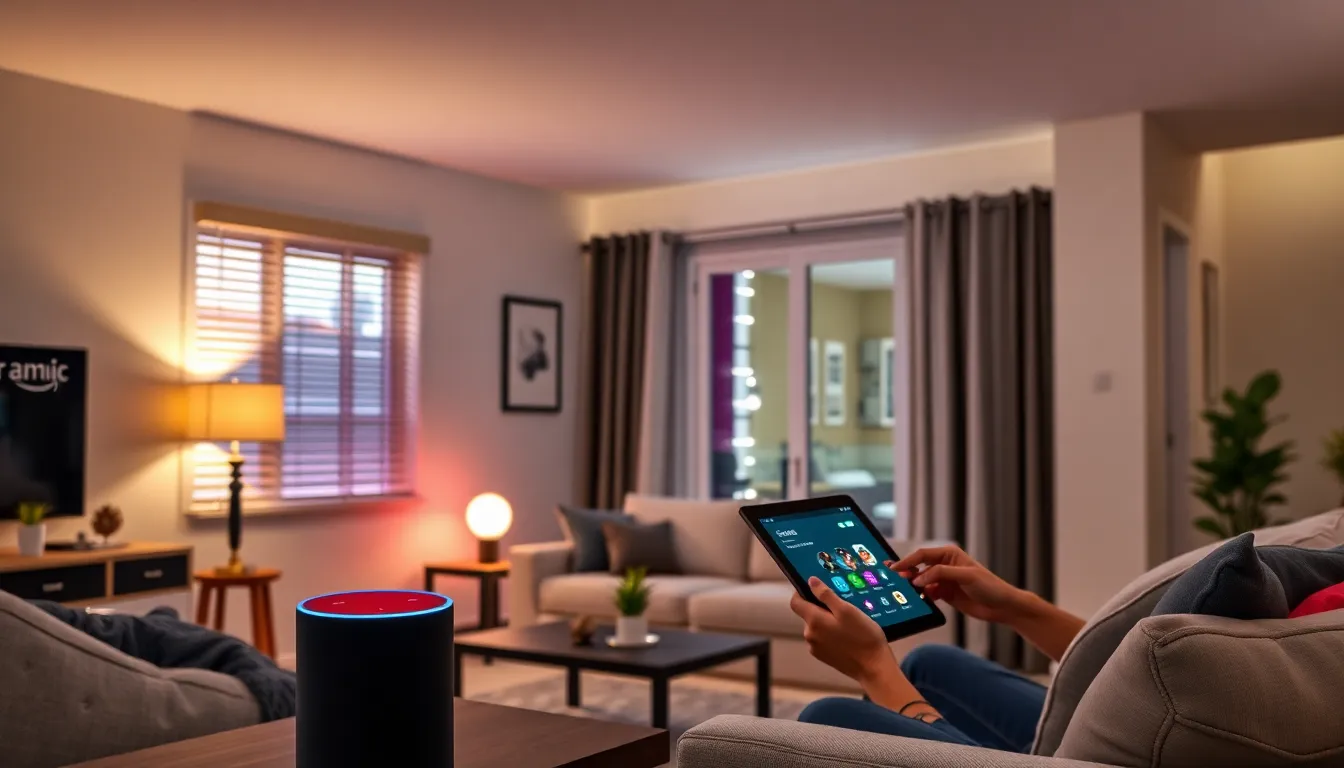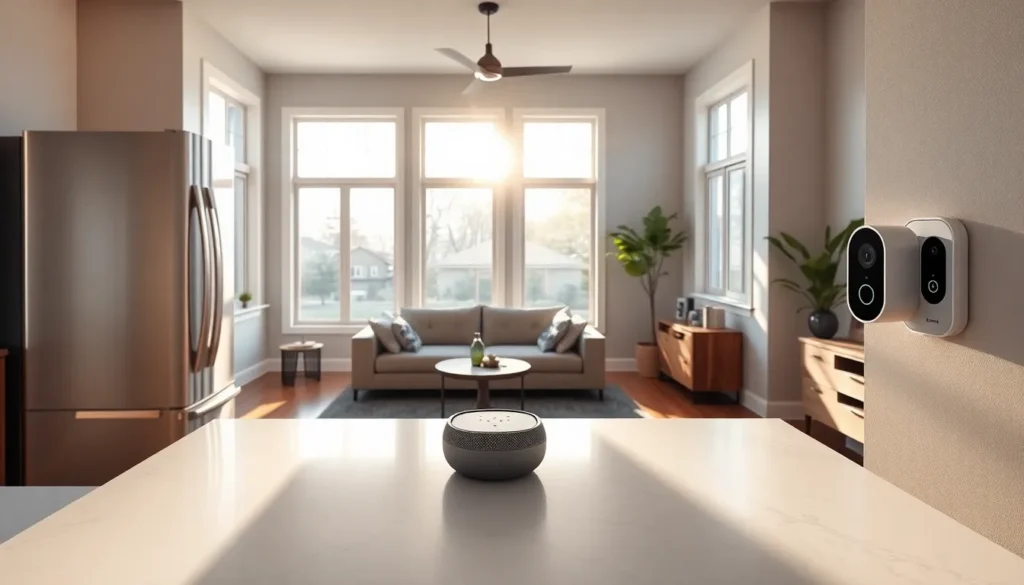Table of Contents
ToggleImagine walking into your home and having it greet you like an old friend. Next-gen home technology is making this dream a reality, transforming ordinary living spaces into smart sanctuaries. From voice-activated assistants that know your coffee preference to appliances that practically do the dishes for you, the future of home living is here, and it’s more exciting than a cat video going viral.
Gone are the days of fumbling with light switches or manually adjusting the thermostat. With innovative gadgets and seamless connectivity, homes are becoming smarter, more efficient, and just a tad more sassy. Whether you’re a tech enthusiast or someone who still struggles with the TV remote, next-gen technology has something to offer everyone. Get ready to embrace a lifestyle where convenience meets creativity, and your home becomes the ultimate co-pilot in your daily adventures.
Overview of Next-Gen Home Technology
Next-gen home technology offers innovative solutions that redefine modern living. This technology encompasses smart appliances, automated systems, and integrated security features. Each component plays a vital role in enhancing convenience and efficiency.
Voice-activated assistants, for instance, simplify daily tasks by providing hands-free control. Users can adjust lighting, control temperature, and access information without lifting a finger. Smart thermostats actively learn routines and optimize energy usage, reducing costs and environmental impact.
Automated security systems enhance safety through real-time monitoring and alerts. Residents can access cameras and locks remotely, ensuring peace of mind from anywhere. Smart lighting adjusts based on occupancy, promoting energy efficiency while enhancing ambiance.
Futuristic technologies, such as smart refrigerators and ovens, make meal preparation seamless. These appliances can suggest recipes based on available ingredients and alert users when groceries run low. Integration with scheduling applications helps create shopping lists effortlessly.
Home automation systems unify control over various devices. These systems provide centralized management, enabling users to customize settings across multiple appliances with a single command. Interconnected devices create a cohesive smart home experience.
Next-gen home technology promotes a lifestyle that embraces innovation and simplicity. Whether through improved energy management, heightened security, or automated convenience, these advancements cater to diverse needs. Homeowners can transform their living environments into intuitive, efficient spaces that adapt to their unique lifestyles.
Smart Home Devices

Smart home devices enhance daily living by seamlessly integrating technology into residential spaces. These innovations bring convenience and efficiency, making homes more responsive to occupants’ needs.
Voice-Activated Assistants
Voice-activated assistants simplify interactions by using natural language processing. Devices like Amazon Echo and Google Nest assist users with routines simply by speaking commands. They control compatible devices, play music, set reminders, and provide weather updates. Integration with smart home ecosystems allows for hands-free operation, contributing to a smooth and effortless living experience.
Smart Lighting Systems
Smart lighting systems provide customized illumination that aligns with user preferences. Products such as Philips Hue and LIFX offer programmable lighting that adjusts based on time of day or activity. Users can control brightness and color temperature from smartphones or through voice commands. Automation can create schedules, ensuring that lights activate and deactivate at optimal times, enhancing energy efficiency and safety.
Home Automation Trends
Next-generation home technology focuses on convenience and enhanced living experiences. Innovations continuously transform residential spaces into intelligent environments.
Energy Efficiency Solutions
Smart thermostats significantly reduce energy consumption by learning user habits and adjusting temperatures automatically. They create comfort while lowering utility bills. Energy monitoring systems track usage patterns, enabling homeowners to adjust consumption for optimal efficiency. Devices like smart plugs and power strips allow for remote control and scheduling, minimizing energy waste. Notably, these solutions often integrate with solar panels, promoting sustainable energy use. Smart lighting systems also contribute by adjusting illumination levels based on natural light, further enhancing energy savings.
Security Innovations
Automated security systems provide peace of mind through real-time monitoring and remote access. Users can check their home security via smartphone apps or receive instant alerts about unusual activity. Surveillance cameras equipped with artificial intelligence can accurately distinguish between harmless movements and potential threats. Additionally, smart doorbells enable two-way communication, allowing residents to interact with visitors or delivery personnel, even when away. Integration with security sensors strengthens the overall safety of homes, offering customized alerts and automatic responses to security breaches, ensuring a comprehensive security solution.
The Role of Artificial Intelligence
Artificial intelligence significantly enhances next-generation home technology by improving efficiency and usability. Smart devices now utilize AI capabilities to adapt and respond better to user preferences.
Machine Learning in Home Technology
Machine learning plays a critical role in evolving smart home devices. It enables appliances, like smart thermostats, to learn heating and cooling patterns, optimizing energy usage. Users appreciate how their devices analyze data from daily activities, which leads to tailored suggestions. Voice assistants incorporate machine learning for improved natural language processing, understanding commands more accurately. By recognizing individual voices, these devices provide personalized responses, further simplifying home management.
Predictive Analytics for Home Management
Predictive analytics transforms the way homeowners interact with technology. It analyzes historical data to forecast energy consumption and pattern trends. Homeowners gain insights that help adjust their consumption habits proactively. Smart security systems utilize predictive analytics to identify unusual activity, enhancing safety measures. By anticipating needs, systems like automated lighting improve convenience while saving energy. Overall, predictive analytics brings a level of intelligence to home management that instills peace of mind.
Future of Next-Gen Home Technology
Advancements in next-gen home technology promise to redefine living spaces. Emerging innovations emphasize connectivity, efficiency, and personalization. Enhanced security features play a critical role, with smart doorbells and AI surveillance cameras allowing for complete monitoring. Many homeowners benefit from real-time notifications that enhance safety measures.
Smart appliances evolve constantly, increasingly integrating with home networks. Refrigerators now manage inventory and suggest recipes based on available ingredients. Cooking aids streamline daily tasks, minimizing preparation time while maximizing convenience. Voice-activated systems transform interactions, enabling hands-free controls of multiple devices.
Energy efficiency remains a crucial focus in modern design, driven by smart thermostats and energy monitoring systems. Devices analyze patterns, optimizing temperature settings and reducing overall consumption. Users notice lower utility bills thanks to increased awareness of their habits.
Home automation not only enhances comfort but also contributes to sustainability. Automated lighting adjusts based on time of day or occupancy, cutting down on energy waste. Appliances programmed to operate during off-peak hours make a sustainable lifestyle easier.
Furthermore, machine learning enhances home technology, enabling devices to adapt seamlessly to individual preferences. Smart assistants personalize interactions, recognizing voices and responding accordingly. Predictive analytics help in optimizing energy usage through data-driven insights, ensuring proactive management.
Innovation shapes the smart home landscape, catering to the unique needs of each household. The future of next-gen home technology centers on an interconnected environment that supports efficiency and enhances everyday living experiences.
Next-gen home technology is revolutionizing how people interact with their living spaces. By integrating smart devices and automation, homes are becoming more efficient and user-friendly. As technology continues to advance, homeowners can expect even greater convenience and personalization in their daily routines.
Embracing these innovations not only enhances comfort but also promotes sustainability and security. With features like smart thermostats and automated security systems, individuals can enjoy peace of mind while optimizing their energy usage. The future of home technology looks promising, paving the way for smarter living environments that cater to diverse needs.







